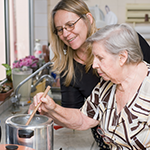 Coordinating healthy menu options that address the nuances around a loved one’s specific health concerns can be challenging for caregivers. While proper nutrition is vital for every age and gender, maintaining a healthy eating plan for individuals coping with one or multiple chronic conditions like COPD, CHF or diabetes can be especially complicated. Many seniors struggle to prepare meals from scratch themselves and rely on frozen entrees. As a care provider, only you will know what’s truly in the fridge, and only you can ensure your loved one’s access to a healthy menu.
Coordinating healthy menu options that address the nuances around a loved one’s specific health concerns can be challenging for caregivers. While proper nutrition is vital for every age and gender, maintaining a healthy eating plan for individuals coping with one or multiple chronic conditions like COPD, CHF or diabetes can be especially complicated. Many seniors struggle to prepare meals from scratch themselves and rely on frozen entrees. As a care provider, only you will know what’s truly in the fridge, and only you can ensure your loved one’s access to a healthy menu.
Though seniors often understand when they need help meal planning, many struggle with this reality. Including them in the management of their diet can keep them feeling empowered and engaged.
Consider these six tips as you help coordinate your loved one’s meals:
Plan together.
Take the time to plan ahead and schedule meals in one-week increments. This is an excellent way to prepare a comprehensive grocery list, keep your loved one involved, and predict how much time will be needed for shopping and meal prep.
Cook together.
Another wonderful way to keep your loved one active and engaged is to cook meals together whenever possible. In some cases, it may be easiest to make all meals for the week during one weekend cooking session.
Maximize leftovers.
You have probably noticed that a typical recipe makes far more than one or two people can eat in one sitting. Have plentiful containers available to package leftovers to keep in the refrigerator or freezer. Write days and meal times on the container to help your loved one decide what foods to eat and when; this also provides you with the ability to check up on whether or not meals are being consumed. Saving and labeling food reduces the likelihood that your loved one will purchase and eat lesser-quality frozen meals from the store.
Keep snacks handy.
Keeping fresh fruit and vegetables prepared and at the ready is a delightful way to have healthy food choices available at all times. Set fruit out in an easy to reach location that is highly visible, such as the kitchen table or counter. Cut up cheese and meat for quick finger foods. This encourages eating and gives nutritional choices at all times. Snack foods are easy to keep around and require little time to prepare.
Be creative.
It is not uncommon for the elderly to experience diminished taste or smell. This can be the result of aging, medications, or treatments such as chemotherapy and can decrease the desire to eat. Were you aware that lemon and other citrus fruits help combat the cotton mouth that chemotherapy patients chronically suffer? Use this type of information to develop creative meal choices and pique interest in foods. Look for flavorful options and invest in fresh ingredients. Find the spices and foods that invoke the greatest positive response and dive into recipes which have those ingredients.
Get help.
Caregiving can often result in a great deal of frustration, and trying to find common ground and address your loved one’s dietary needs and desires can be especially demanding. Dietary considerations are extremely important for seniors returning home from a hospital stay. According to the Centers for Disease Control and Prevention, 19% of all hospital readmissions are the result of non-adherence to diet. It’s alright to ask for help if you’re feeling overwhelmed or confused. As a caregiver you’ll want to ensure your loved one remains safe at home during recovery; with Residential Home Health, registered dieticians and nurses are available to help educate you and ensure your loved one stays on track.
Residential Home Health’s CHAMP Program (Cardiopulmonary Hospital Admit Management Program) significantly reduces the likelihood of a chronically ill patient returning to the hospital. Specially trained cardiac and telehealth nurses are available to support patients, and personal coaching on modifications for long-term behaviors such as diet, exercise, and medication compliance is provided to both patients and caregivers. Learn more about Residential Home Health’s CHAMP Program and how it can help you and your loved one manage proper care at home and reduce the likelihood of readmission to the hospital in the video below.
Available 24/7 – Talk to a nurse now. Click to call 866-902-4000

